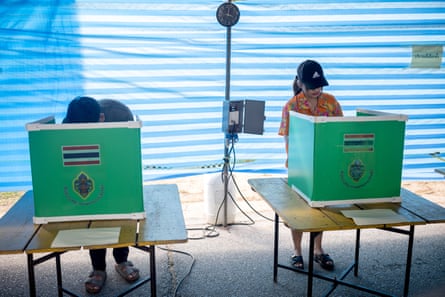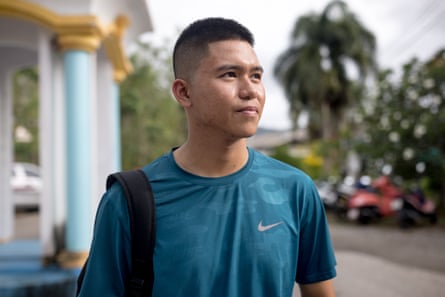As the date for the military draft loomed, Napasit Tonsiedee, 23, from Buriram, north-east Thailand, visited the temple, bathed in holy water and prayed the odds would land in his favour.
He, like many other young men in Thailand, was part of a lottery that would determine whether he would be forced to complete military service. If you pull a red card, you are drafted for two years; a black card means you are exempt.
The annual draft lottery – which some political parties have proposed scrapping – is one of the many issues weighing on young people’s minds ahead of elections.
Much to his relief, Napasit pulled a black card. He hopes the system will end under a new government.
Paetongtarn Shinawatra’s Pheu Thai party, which is expected to win the most seats, has courted young voters by saying that a landslide win would allow it to oust the military generals. It has promised it will push to end the military draft, approve equal marriage and raise the minimum wage.
Sunday’s election will pit Paetongtarn, the scion of the Shinawatras, a family that has long dominated Thai politics, against former army generals. Her family remains popular in the north and north-east of Thailand – though are strongly opposed by conservative military royalists.

But her party faces major challenges: from an electoral system weighed against them (senators, who vote alongside the lower house for a future prime minister, were all appointed by the military) as well as from the Move Forward party.
Move Forward is the most progressive party, and has drawn huge crowds of engaged young voters. It was the first to promise the end of mandatory military conscription, and has pledged to demilitarise politics and break up the big monopolies that dominate the economy.
‘The military should be in the barracks’
The political outlook of first-time voters has been shaped by the incumbent prime minister, Prayuth Chan-ochaa, a former military general who first came to power in a coup in 2014, said Dr Pitch Pongsawat of Chulalongkorn University.
Mok, 30, who asked to give only one name, says she wants reforms so that the country’s generals stop interfering in politics. She says that every time there is a coup – there have been two since 2006 – it causes the country to stagnate.
“Every time it happens it holds Thailand in one place. The military should be in the barracks.”
This weekend’s election is the first to be held since mass youth-led protests in 2020, which called for Prayuth to stand down and for the military to be removed from politics.
Student protest leaders also risked jail to call for the royal family’s power and wealth to be curbed, and for the lese majesty law – which outlaws and punishes criticism of the monarchy – to be removed. Since the protests more than 230 people, including children, have been charged under the law, which can lead to 15 years in jail.
Whether citizens should have the right to criticise the monarchy has emerged as a new political faultline and this election is the first time the lese majesty law has been debated by public leaders in a substantive way, said Ken Mathis Lohatepanont, a political commentator.
“The fact that this [debate] has happened was the result of the protests. But whether or not that’s actually going to lead to real change, that’s very much dependent on the makeup of the next coalition.”
Move Forward has said it will push for reform of the law, while Paetongtarn has said the matter should be debated in parliament. Conservative parties are staunchly opposed to reform.
‘I hope I don’t get cheated’
Natchaya, 18, a first time voter in Chiang Mai, hopes for change. “A lot of my friends got charged with article 112 [the lese majesty law]. I know if I make a mistake, one day it could come to me. The law should never have been this way.”
She was at school when the 2020 protest movement emerged, and became involved in activism, campaigning for changes to the education system, including greater freedom of thought in schools.
“[The school system] is designed to teach students to obey, to make us become ‘good people’ according to their definition. It leads to a lack of diversity in Thai society.”

“I want the curriculum to come from several sources, not only from the Thai government, especially in history classes.”
She also wants greater workers’ rights, and action on air pollution, having lived through the months of thick haze caused by agricultural burning. “The pollution in Chiang Mai is not a joke, our lives are being shortened every day.” Some parties point only to farmers in the fields, not the big companies that profit from the produce, she adds.
In the south of Thailand, Ekapong Noojaroen, 24, who is from Songkhla, said he too wants more investment in the quality of education in state schools. He also wants jobs to be created in areas outside the capital.
“I don’t want us to have to go to Bangkok to work.” Of his childhood friends, as many as 80-90% have left to find work elsewhere, he said as he took part in early voting in Phuket on Sunday.
Saksit Konkrathok, 24, who was also taking part in early voting in Phuket, agrees that greater investment is needed in areas outside the capital, and says it is hard for young people to get jobs.
Both add they want a future in which the electoral process is more democratic, without the influence of military-appointed senators, and with a fairer voting system. “The most important thing is that my true vote is really counted. I hope I don’t get cheated in any way,” Saksit said.


